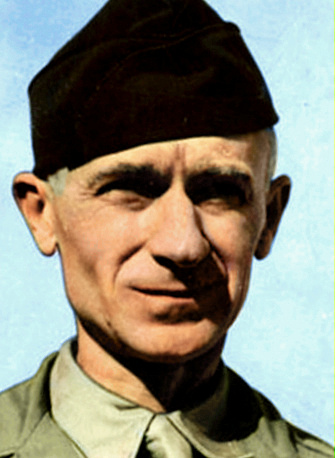Eisenhower to be member of Reich military regime
Byrnes’ aide named deputy to general in handling civil affairs in occupied Germany
…
Britain plans to insist on tough peace for Reich
By Virgil Pinkley, United Press staff writer
…
Byrnes’ aide named deputy to general in handling civil affairs in occupied Germany
…
By Virgil Pinkley, United Press staff writer
…
Even Communists split over problem
By Henry J. Taylor, Scripps-Howard special writer
…
Daughter’s husband is Nazi prisoner
…
How far depends on ability of Allies to keep supplies moving, observer says
By Boyd Lewis, United Press staff writer
…
By Robert Meyer, United Press staff writer
…
…
Plant cites union’s bars to efficiency
…
…

By Ernie Pyle
IN THE WESTERN PACIFIC (delayed) – On our airplane carrier, we are all wondering what day Mrs. Speidel had her baby. Here is the reason we wonder:
Her husband is Lt. John Speidel, who pilots a torpedo bomber from our carrier. He is only 22, and naturally was excited at the prospect of becoming a father. His wife lives in Philadelphia.
Now Lt. Speidel isn’t so young that he believes literally the date of arrival which the doctor gives several months ahead of time, but at least it’s something to shoot at.
And so it came about that the date and Lt. Speidel’s assignment on his first mission over Tokyo coincided. He thought what a wonderful double event.
But at the last moment the mission was canceled and our entire task force counted its scores and headed south. The double went aglimmering.
Next day we were within flying distance of the Japanese islands to the south, and we suddenly get orders for a special bombing mission on them. Lt. Speidel went.
And his plane got shot up. He was lucky to get back at all. He had a hole in his wing, he couldn’t get his flaps down, and his airspeed indicator was shot out. It seemed improbable that he could land at all.
Waved over to big carrier
He made two tries at it. Both looked disastrous, and he was waved off. He simply couldn’t slow down enough. So they sent him over to one of the big carriers with lots of deck room, and he landed all right over there. It was quite a day.
Now some of us older hands realize that a baby may be born the day before the doctor predicts, or the day after. So, we wonder if Lt. Speidel might just possibly have had his two big days in one after all.
EDITOR’S NOTE: Mrs. Speidel reports the baby came early. He was a week old the day his father was bombing the Jap islands. The baby’s name is John Jr. and he’s doing fine. So is Mrs. Speidel.
The two men who fly with Lt. Speidel are Al Kerby, radioman from Woodbury, New Kersey, and Gunner William Groepper of Avoca, Indiana. They’re interested in what happened too.
Remember the boys we wrote about yesterday – Ens. Robert Buchanan who was shot down into Tokyo Bay, and Lt. John Fecke, who directed the rescue?
Well, it wasn’t the first time those two had seen exciting times together.
Last fall, off Formosa, a flight of 70 Jap planes pounced on two of our cruisers that were crippled. Fecke was leading a flight of eight, of which Buchanan was one.
Those eight took on the 70 Japs. They shot down 29 of them, lost one plane, broke up the attack and saved the cruisers.
Fecke and Buchanan each got five Jap planes in that one foray. And each got the Navy Cross for the job. So, this little Tokyo Bay incident didn’t rattle them.
Lieutenant fools Ernie
When I first saw Lt. Fecke, I said to myself, “There’s a westerner for sure.” He just has that weather-beaten, cowboy look. I liked him before I ever really knew him.
And then he fooled me by turning out to be a New Englander, Massachusetts-born, and a New Hampshire University graduate, in a business course at that. He’s 26 now.
But he has the westerner’s knack for steadiness. He is very quiet and polite. He knows how to do things. He never gets excited. He has shot down seven planes.
The others describe him as the man you’d like to have along if you ever got the trouble. To which Ens. Buchanan would undoubtedly say “Amen!”
![]()
The night after our strike on the southern islands, everybody was relaxed and felt that wonderful sense of relief over a dangerous job being finished.
That night we showed a movie for the first time in three or four days. It was a western, called The Lights of Old Santa Fe, with a regulation hero and villain and runaway horses and shootin’ and everything.
Those fliers received it like modern audiences receive The Drunkard. We almost hissed the villain off the screen. We booed at all underhand business. We cheered all good deeds. We whistled and clapped when the hero took the girl in his arms.
I think we enjoyed it more than any movie on the whole trip.